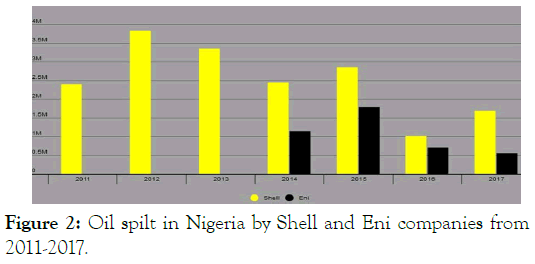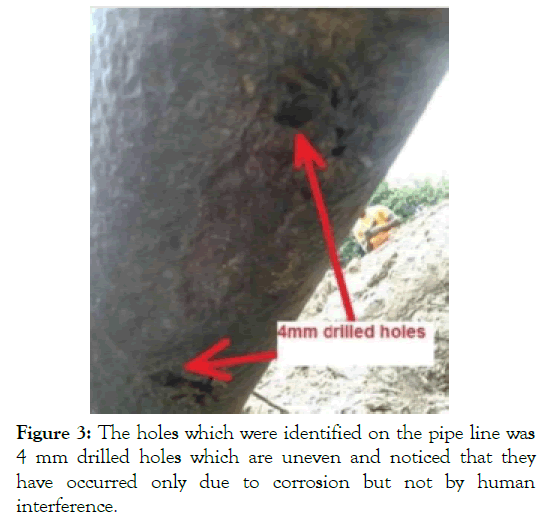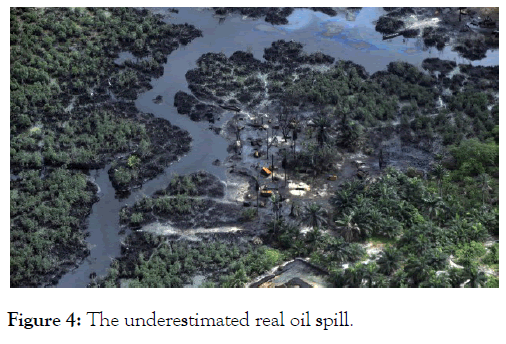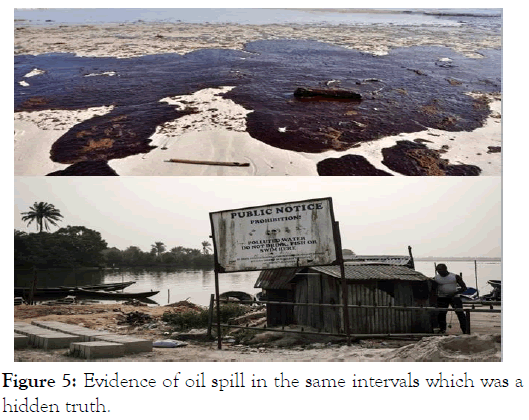Indexed In
- SafetyLit
- RefSeek
- Hamdard University
- EBSCO A-Z
- OCLC- WorldCat
- Publons
Useful Links
Share This Page
Journal Flyer

Open Access Journals
- Agri and Aquaculture
- Biochemistry
- Bioinformatics & Systems Biology
- Business & Management
- Chemistry
- Clinical Sciences
- Engineering
- Food & Nutrition
- General Science
- Genetics & Molecular Biology
- Immunology & Microbiology
- Medical Sciences
- Neuroscience & Psychology
- Nursing & Health Care
- Pharmaceutical Sciences
Commentary Article - (2021) Volume 24, Issue 9
Polluted Nigeria Delta âEven What is Leftâ
Pallekonda Kiran Prakash* and Shirley KalavalaReceived: 18-Oct-2021 Published: 08-Nov-2021, DOI: 10.35248/2473-3350.21.24.478
Commentary
Nigeria hold about 2.2% of worlds total oil revivers on an average 2,40,000 barrels of crude if being spilled into Nigeria delta every year due to mechanical failures, human negligence and pirates attack on crude oil tankers. A wide range of coastal zone is being polluted in the Nigeria. The Nigeria delta was the most polluted place on the earth. 17.5 million litres of crude oil is being spilled in Nigeria Delta and 4.1 million litres of crude oil is being theft by pirates. There is many more oil split investigation cases which needs to be reopened.
The massive splits of oil by SHELL Company in 2008 and 2009 have a catastrophic impact. The thick black oil leak in the rivers for weeks have caused the death of aqua species and also showed tremendous effect on people who are living in that area (Figure 1). Amnesty Internationals have taken a legal action against this which was settled out of count by paying 55 million pounds as compensation.
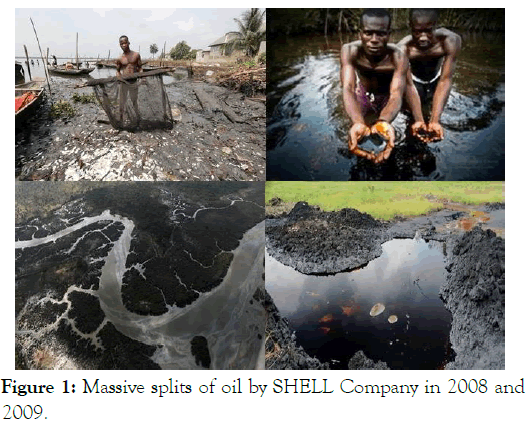
Figure 1: Massive splits of oil by SHELL Company in 2008 and 2009.
As per the reports by Amnesty Internationals the oil spills frequency was very high, pollution caused by oil is very high. The oil spills by Shell and Ente Nazionale Idrocarburi companies from 2011 to 2017 are shown in Figure 2.
Figure 2: Oil spilt in Nigeria by Shell and Eni companies from 2011-2017.
The reason said by the company’s is that oil spill is being cause by drilling the pipe lines which is being done by the pirates to theft the oil. In fact it was proven that the oil spill is being caused by the corrosion of the pipe lines (Figure 3) and there is no evidence found that pipe lines are being drilled. The oil companies are blaming that oil spill are caused by drilling the pipe lines so that they need not to any kind of compensation. The detective agencies have sent 89 oil spills reports to the Nigerian government to reopen the closed investigation.
Figure 3: The holes which were identified on the pipe line was 4 mm drilled holes which are uneven and noticed that they have occurred only due to corrosion but not by human interference.
4 mm drilled holes which are uneven and noticed that they have occurred only due to corrosion but not by human interference.
The oil spill volumes are inaccurate and the companies have underestimated the real volume spill. Ente Nazionale Idrocarburi oil company has reported 820 oil spills which was about 4.1 million litres lost. Shell oil company has reported 17.5 million litres lost which almost equal to 7 Olympic swimming pools (Figure 4).
Figure 4: The underestimated real oil spill.
In reality it was very worst the companies showed the vastly difference to the government of Nigeria. About 1659 oil spill by Ente Nazionale Idrocarburi oil company and 1369 oil spill by Shell oil company have happened in the same interval of time (Figure 5).
Figure 5: Evidence of oil spill in the same intervals which was a hidden truth.
As per the data from the National oil spill Detection and Response agent about 3,364,084.375 litres of oil have been spill into Nigeria delta in 2020 which was almost 50% less oil spill when compared to 2019. The serious negligence of the multinational companies making the Nigerian Delta as most polluted place on the earth. They have failed in tackling and prevention of oil spill which are being happening in the same period of time. Precautionary measures should be taken to decrease the oil spills and to save the lives of people.
Citation: Prakash KP, Kalavala S (2021) Polluted Nigeria Delta “Even What is Left”. J Coast Zone Manag. 24:478.
Copyright: © 2021 Prakash KP, et al. This is an open-access article distributed under the terms of the Creative Commons Attribution License, which permits unrestricted use, distribution, and reproduction in any medium, provided the original author and source are credited.

